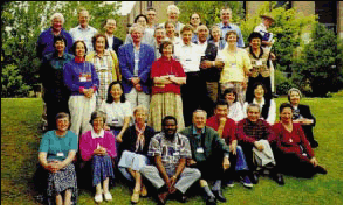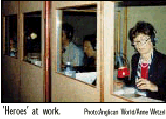|
Their aim: never to
be stuck for a word
With discussions and debate rising on the interpreters' horizons this week, one concern becomes apparent: the pace of business and voting.'' ``We are relying on the chairpersons to take it slowly,'' Mrs Coleman says, explaining that bishops using interpreters will be voting on the previous question if the process moves too rapidly. The pacing of business is important to minimise confusion for the more than 100 bishops using the translation services.
``You're great heroes!'' chimes Mrs Coleman. Mr Faerber adds: ``We want all the bishops to be able to participate and to speak in the fullest context.'' He expresses concern that preConference papers were printed only in English and hopes future meetings will consider translating even more documents. Jerome Moriyama, in charge of the Japanese interpreters, says all Japanese bishops required interpreters in 1978. ``This time four out of eight don't need any help.'' Mr Moriyama says the lack of preissued texts has made the interpreters' task a challenge but bishops and spouses have been very appreciative of all their efforts. The Burmese interpreter arrives at the office door and doesn't have time to put down her bags before being whisked off to work. The phone rings and a line is forming at the door, people clamouring for Mrs Coleman's attention. Interpretation: back to work!
Back to front page of this issue |

 Teams
of interpreters spent their ``free weekend'' working through the small hours to interpret resolutions into French,
Spanish and Japanese, says Donata Coleman, coordinator of the 41-strong team assembled for the Lambeth Conference.
Her calm demeanour never wavers as nine people rush into her tiny office to drop off or pick up more papers. Many
accents make enquiries in English, then are gone as rapidly as they arrived, to finish their assigned tasks.
Teams
of interpreters spent their ``free weekend'' working through the small hours to interpret resolutions into French,
Spanish and Japanese, says Donata Coleman, coordinator of the 41-strong team assembled for the Lambeth Conference.
Her calm demeanour never wavers as nine people rush into her tiny office to drop off or pick up more papers. Many
accents make enquiries in English, then are gone as rapidly as they arrived, to finish their assigned tasks. Interpreters
have not only worked in the plenaries and sections, but nearly all attended the Bible studies and small groups
to help individual bishops. Neither the resolutions nor small groups were part of the original commitment by the
mostly volunteer staff but ``they rallied round to fill in all the gaps,'' Mrs Coleman says. French interpreter
Robert Faerber says his team is preparing regional and interfaith resolutions, as well.''
Interpreters
have not only worked in the plenaries and sections, but nearly all attended the Bible studies and small groups
to help individual bishops. Neither the resolutions nor small groups were part of the original commitment by the
mostly volunteer staff but ``they rallied round to fill in all the gaps,'' Mrs Coleman says. French interpreter
Robert Faerber says his team is preparing regional and interfaith resolutions, as well.''